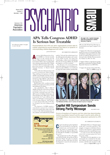Virginia and Illinois recently enacted legislation to prohibit teachers in public schools from recommending that students be given psychotropic drugs.
Similar to the Connecticut law that went into effect last year (Psychiatric News, August 17, 2001) the Virginia and Illinois laws enacted in April and July, respectively, restrict the role of school health staff, educators, and administrators to recommending that a student be evaluated by an appropriate medical practitioner. School personnel, in addition, must obtain the written consent of the student’s parent or guardian before consulting with the practitioner, according to the laws. Additional provisions in the Illinois law require that each school board adopt and implement a policy that a student cannot be disciplined because the parent or guardian refused to administer or consent to the administration of psychotropic medications, according to the law (PL 92-663).
Each school board’s policy must also require that at least once every two years certified school personnel and administrators are trained in current best practices on the identification and treatment of attention deficit disorder and attention-deficit/hyperactivity disorder (ADHD), the application of “nonaversive” behavioral interventions in the school environment, and the use of psychotropic medication for school-age children, according to the law.
Clarke Ross, chief executive officer of Children and Adults with ADHD (CHADD), told Psychiatric News, “We support this type of legislation that requires parents be informed and consent to evaluations and the use of psychotropic medications. This may encourage more appropriate communication between teachers, parents, and medical practitioners.”
Ross added that CHADD supports the Illinois provisions with a few caveats. “We believe the current best practices are the guidelines developed by the American Academy of Pediatrics and the American Academy of Child and Adolescent Psychiatry that recommend multimodal treatment. We don’t want to see school boards develop policies that require that medication be used only as a last resort,” said Ross.
At least 25 states have introduced bills, regulations, or resolutions in the last few years to limit the use of psychotropic medications in school children, according to Ross.
“Other than the Connecticut bill, legislation enacted last year focused on requiring state agencies or commissions to study the use of psychotropic medications or develop standards for their administration to youth,” said Ross.
A summary of related state legislative actions as of February 2002 and CHADD’s legislative position can be accessed on the CHADD Web site at www.chadd.org by clicking on “Press Releases 2002.”
